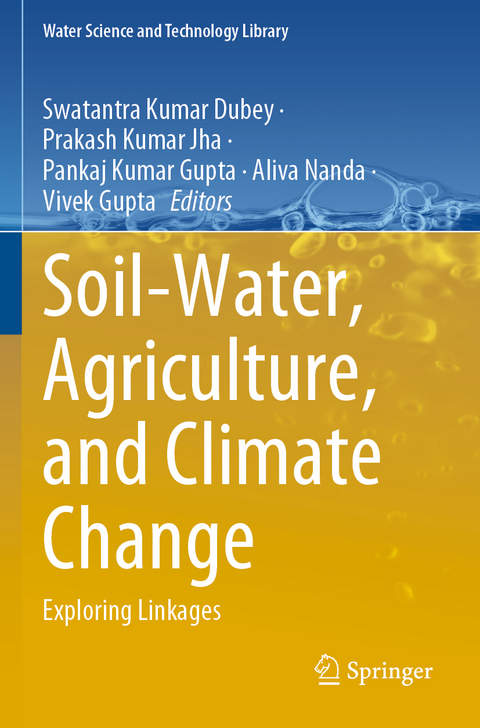
Soil-Water, Agriculture, and Climate Change
Springer International Publishing (Verlag)
978-3-031-12061-9 (ISBN)
lt;b> Dr. Swatantra Kumar Dubey is currently working as a researcher professor at Seoul National University of Science and Technology, Seoul, South Korea. His research focuses on water and food security indicators development using hydrological and crop modeling. Dr. Dubey holds experience in the impacts of climate and land-use changes, water resources management, droughts, water quality and climate extremes. He received M.Sc. (Tech) in environmental science and technology from the Banaras Hindu University, India, and graduated from the Central University of Rajasthan, India. Dr. Dubey has worked with different institutes i.e. CSIR-National Environmental Engineering Research Institute (CSIR-NEERI), Indian Agricultural Research Institute: ICAR (New Delhi) and Indian Institute of Science Education and Research (IISER) Bhopal, Madhya Pradesh. He has reviewed several research articles for reputed journals like River Research and Applications, International Journal of River Basin Management, Geology, Ecology, and Landscapes, Remote Sensing Letters, Sustainability, Water, Diversity, International Journal of Environmental Research and Public Health, ISH Journal of Hydraulic Engineering and others. He is a lifetime member of the Indian Meteorological Society and a core-member of the society of young agriculture and hydrology scholars of India (www.syahindia.org).
Dr. Prakash Kumar Jha is currently working as a postdoctoral researcher at the Feed the Future Sustainable Intensification Innovation Lab (SIIL), Kansas State University, USA. He is a crop modeler with interest in sustainable agricultural systems. His specific research interests focus on investigating the influence of agronomic management on crop growth and development from field to ecological scale. He investigates complexities in agricultural systems, integrating crop simulation models, remote sensing, and climate forecast to formulate decision support systems for better management strategies at multiple scales of agroecosystems. He is passionate about teaching and the opportunity to mentor students interested in sustainable agricultural landscapes and fundamentals of digital agroecosystems. He has published more than 20 research papers and has reviewed several research articles for reputed journals like, Agricultural Systems, Agronomy, Agronomy Journal, Computers and Electronics in Agriculture, Crop and Pasture Science, Environmental Modeling & Software, Environmental Research Letters, Nature sustainability, Plant Methods, Plants, Scientific Reports, Sustainability, Water, and others.
Dr. Pankaj Kumar Gupta is a contaminant hydrogeologist, after having completed his Ph. D from IIT Roorkee, he has been a Postdoctoral fellow at the University of Waterloo, Canada. Recently he has been awarded prestigious Ramanujan fellowship of the SERB (Govt. of India). The majority of his works focus on two areas: (1) understanding the soil moisture flow and pollutant mobility into soil-water systems and (2) developing water resource, pollution management strategies. Dr Gupta holds his in depth experience of incorporating novel technologies (viz. geophysical investigations, groundwater modelling, aquifer mapping and water quality assessment etc.) to map aquifers of 30+ sites in India. He also teaches and guides master and Ph. D students with diversified knowledge. He has received an AGU Travel Grant (2017), JPGU Travel Grant (2018), and EXCEEDSWINDON and DAAD Germany Grant (2018). He serves as an editorial board member for SN Applied Sciences, Biochar, Carbon Research and Frontiers in Water journals. He has published more than 20 research papers, approximately 30 book chapters, edited 2 books and two popular science articles. He has reviewed several research articles for reputed journals including RSC Advances, Groundwater for Sustainable Development, ASCE JEE, ASCE Irrigation and Drainage, Env. Sc, Pollution Research, Eco-hydrology, Journal of Conta
Understanding Hydrology of Indian Himalayan landscapes- A Review.- Development of a semi-distributed rainfall-runoff model for water budgeting in macropore dominated hilly river basins.- Hydrological Simulation Using Coupled ANN-SCS Approach in Pagladiya Watershed: A Sub-catchment of Brahmaputra River Basin.- Water erosion risks mapping using RUSLE model in the Mohamed Ben Abdelkrim El Khattabi Dam watershed (Central Coastal Rif, Morocco).
| Erscheinungsdatum | 06.11.2023 |
|---|---|
| Reihe/Serie | Water Science and Technology Library |
| Zusatzinfo | XI, 376 p. 81 illus., 80 illus. in color. |
| Verlagsort | Cham |
| Sprache | englisch |
| Maße | 155 x 235 mm |
| Gewicht | 593 g |
| Themenwelt | Naturwissenschaften ► Geowissenschaften ► Hydrologie / Ozeanografie |
| Schlagworte | Climate assessment • Ecological services • Machine learning, artificial intelligence, GIS, remote sensing • restorations • Soil and water systems • Soil health and agriculture • Water security |
| ISBN-10 | 3-031-12061-2 / 3031120612 |
| ISBN-13 | 978-3-031-12061-9 / 9783031120619 |
| Zustand | Neuware |
| Haben Sie eine Frage zum Produkt? |
aus dem Bereich


